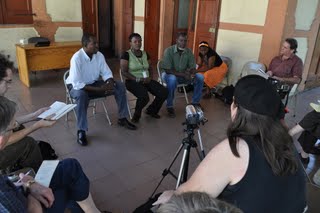
We spent the entire day today at the Bureau des Avocats Internationaux (the Bureau of International Advocates, a lawyers group linked with the
Institute for Justice and Democracy in Haiti) gathering testimonies from a variety of people from social movement organizations, and we will return tomorrow for more. The testimonies ranged between moving, fascinating, informative, repetitive, and long-winded. Here are a couple main themes that emerged:
Most of the people we have talked to emphasize the importance of the return of Aristide to Haiti. Popular movement activists emphasize that under his government they had hope for better education and health care, and all of that is gone under the current government. Several people mentioned that aid that comes into the country never seems to trickle down to the people who need it and could use it. Aristide was the only person who cared about people. The opposition was not so much against Aristide as against the huge majority of people he represented. If the international community cared about Haiti, they would send Aristide back. The return of Aristide would change the lives of people, and he does not only have to be president to play that role.
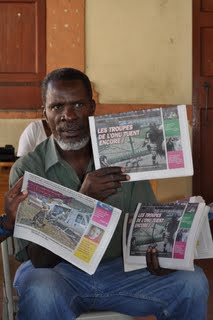
Many people from popular movements are very critical of the UN occupation of Haiti since 2004, blaming them for human rights abuses including shooting civilians and sexually abusing young girls. A journalist from the newspaper
Haiti Liberte (Haiti Liberty) complained that the UN mission only protects the interests of the wealthy while terrorizing the poor. Complicating the problem is the co-opted judicial system which holds dissidents in long detentions without a hearing as an excuse to keep them in jail. One person asked whether the UN mission was about peace or fear.
The role of Brazil in the UN mission indicates that president Lula da Silva appears to be ok with this pattern of human rights abuses. For these activists, it challenges a perception that he is of the left, but rather they have come to see him as fundamentally reactionary. His government is different from those of Evo Morales in Bolivia, Hugo Chavez in Venezuela, or Fidel Castro in Cuba who govern for the people based on the ideals of freedom and liberty for Latin America. Rather, Brazil's role in Haiti is motivated by powerful economic interests as they try to expand into new markets and solidify their role as the leading economic player in Latin America. Brazil, the journalist emphasized, is following the US, France, and Canada in becoming a new imperial power that forces their agenda on smaller countries.
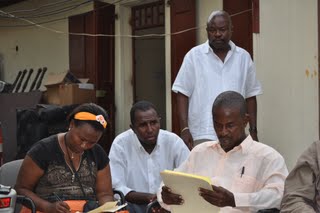
Representatives from peasant groups described a situation of little agricultural technology and less government support for that sector even though Haiti remains a largely rural society. The agricultural economy is further undermined when aid agencies import cheap food for distribution. Often farmers will harvest fruit trees for charcoal to meet their immediate and urgent economic needs rather than allowing them to mature for their longer term food production. Such economic crises leads to deforestation, further ecological degradation, an inability for Haiti to feed itself, rural-urban migration, and increased levels of poverty and oppression.
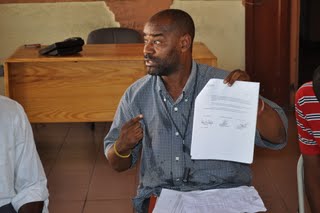
Both peasant and labor groups emphasized that globalization creates conditions that makes it difficult to fight for better wages and living conditions. Private companies have cracked down on unions with persecutions and firings. Others have tried to co-opt unions into defending corporate interests. Sometimes this takes the form of drawing previous union activists into the government as a way to undermine their labor activism. Other times owners buy out labor leaders. As a result, since 2007 the Central of Haitian Workers (CTH) is no longer working on behalf of the workers. In fact, the UN occupation force cooperates with the bosses in undermining worker interests. A result is a decline in worker wages.
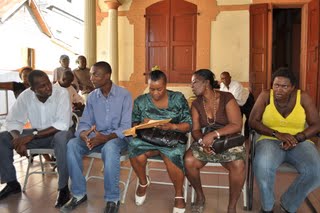
Informal market vendors blamed the current Preval government for burning down 30-40 market stalls. In the meantime, their operating costs have risen dramatically. The vendors have no place to complain, and the government does not provide help. Rather, the government implements policies that only benefit the interests of large corporations and their distribution networks. Neoliberal policies and privatization schemes leads to more suffering for marginalized people.
Several speakers repeatedly returned to the theme of while they are in favor of democratic elections, the process that is in place for February 28 is more of a selection rather than an election. They are against such "selections." Preval does not remember who put him in power, and has taken a strong stance against the electoral interests of popular movements. Allowing these elections to proceed forward in this manner will only prove to advance Preval's neoliberal agenda. Many activists are calling for a boycott of the election because they have not been included as part of the process. One activist asked us to tell the international community to stop the election because it will not help the Haitian people. Preval is once again establishing a system of slavery in Haiti.
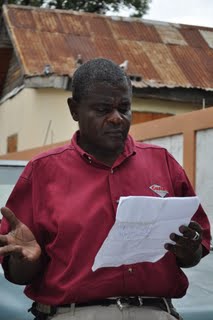
One activist cautioned that Haiti was headed toward a bloodbath worse than what happened in the aftermath of the 2004 coup. Popular movements are not with the current government, and their level of frustration is rising. Another activist noted that his brother was killed just 2 days before the last election, leaving his 10 children in his care. He does not have the resources to care for the children, and is worried that he could also be a target of political violence in this election.
The final speaker concluded that it was important for us to come and listen to the stories of the poor in Haiti so that Obama can hear their stories.

